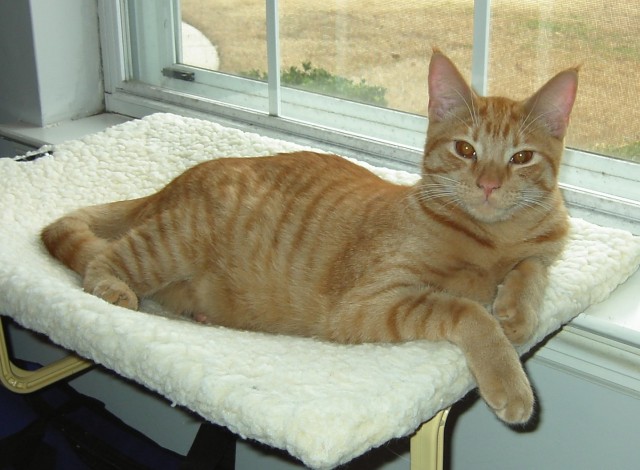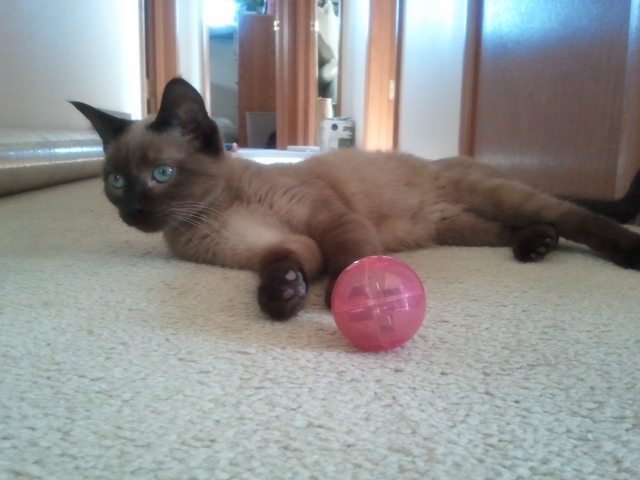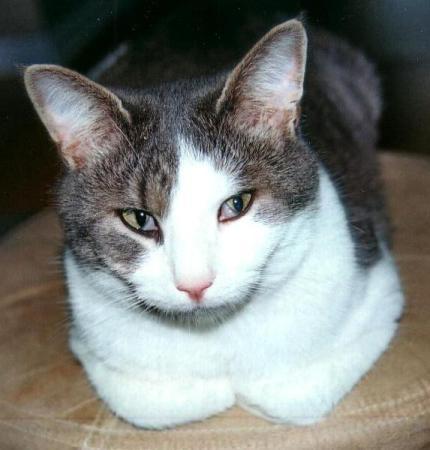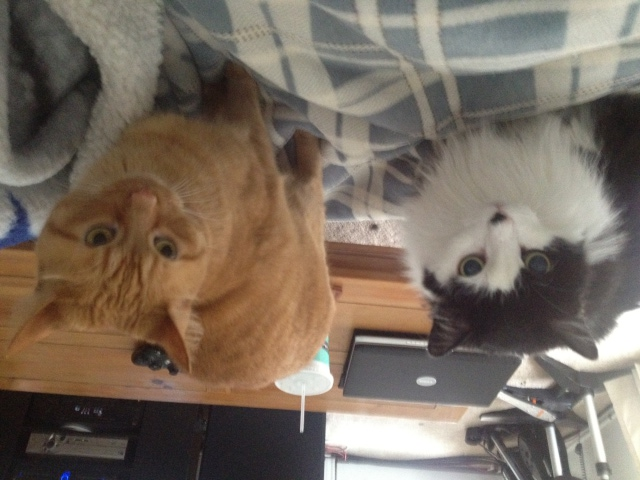QuestionI have a 3-cat household: a 7-year-old male domestic medium-hair (with me
for 5 years) and 2 young DSH females--a tortoiseshell around 18 months old
(a stray i rescued 14 months ago) and (best guess based on Google image
search) a lynx-patterned torbie that's about 12 months old (another stray
rescued 5 months ago). They are all spayed/neutered; up to date on shots;
share food, water and litter box with no problems; and get along famously,
especially the 2 little ones (the tortoiseshell grooms the others frequently,
and the females enjoy tormenting the christmas tree together).
Today, with no warning, the tortoiseshell has become aggressive toward the
other cats, mostly with the other female (and only vocally aggressive--I
haven't witnessed any physical altercation). After a morning of hissing,
screeching and hiding away under chairs and beds, I took her to the
emergency vet (xmas eve) though she displayed no other physical symptoms
of illness (no apparent changes in feeding or evacuation habits). She remains
loving and friendly with me and with my parents (who also live with us). She
was calm during the drive to the vet and played with her "blankie" and purred
while we waited.
All vitals were normal, and the vet found no problems during the physical
exam. He said they could do a complete blood workup but there was nothing
specific he expected to find. I opted not to do the bloodwork since she has a
checkup with her regular vet soon.
In the meantime, I'm at a loss. Since returning from the vet, she's still hiding
but venturing out periodically--a little less antagonistic with the older cat
(who's pretty much avoiding the whole mess anyway) but still sounding like
she wants to kill the other female.
Any suggestions are most welcome. Thank you for your time and expertise.
AnswerMoira,
Sudden changes in your cat's behavior mean that you should take them to the vet for a complete check up with blood and urine tests to rule out medical causes. Since everyone else is getting along well I would suggest that Miss Tortie is put into a room by herself with food, water and a litter box. This way you know for sure how much she is eating and drinking and whether or not that is reflected in the litter box. That way you have something more specific to tell the vet when she goes. My 9 year old tortie started hiding and grumping with the other cats in my household. We ended up taking her to the vet because the behavior was so out of character for her that we were concerned. We opted to do the blood work and found that she had abnormal kidney function. She spent a week in the hospital at my regular vet's office. Now she is being treated at home with periodic subcutaneous fluids. The moral of the story is basically that if you think that something is wrong you are probably right. You know your cat best, it is not easy for a vet who doesn't know your cat to assess behavioral changes. The way that I see it, once you isolate her you will have a better idea of what she's doing and you will be able to tell the vet how she is eating, drinking and using the box. The period of isolation has the advantage of giving everyone time to cool off. If there is no obvious medical cause for your little girl's behavior then I would suggest a gradual reintroduction into the household in a controlled and well supervised manner. Good luck, and please keep me posted on how your little one is doing. If you have any further questions or concerns, please do not hesitate to contact me again.

 Lost Cat questions
QuestionRusty
QUESTION: Ali,
My new
Lost Cat questions
QuestionRusty
QUESTION: Ali,
My new
 Cinnamon, mysterious Siamese
Question
Cinnamon - mysterious
Hi, I picked you
Cinnamon, mysterious Siamese
Question
Cinnamon - mysterious
Hi, I picked you
 third eyelid, weight gain, irritability
Question
third eyelid pic
I have a 2 year old male cat
third eyelid, weight gain, irritability
Question
third eyelid pic
I have a 2 year old male cat
 Rain
Question
my cat
Hi, i was wondering if you could help m
Rain
Question
my cat
Hi, i was wondering if you could help m
 Cat peeing on floor after other cat died
Question
My babies
I have a 6 year old tabby (my
Cat peeing on floor after other cat died
Question
My babies
I have a 6 year old tabby (my